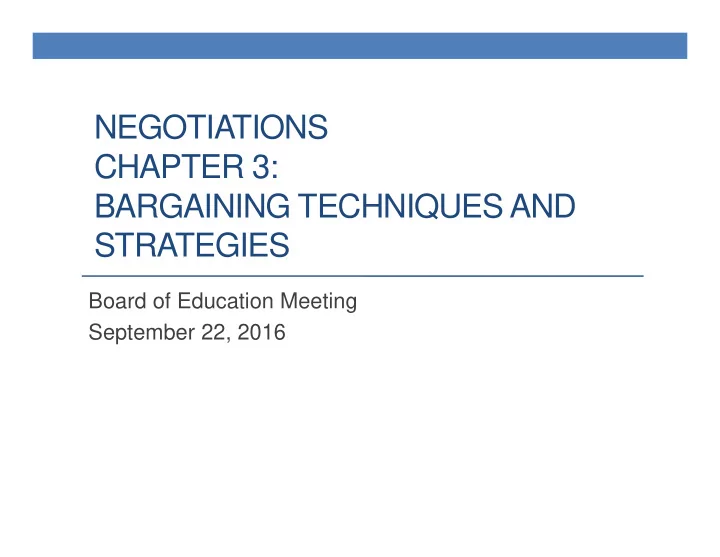

NEGOTIATIONS CHAPTER 3: BARGAINING TECHNIQUES AND STRATEGIES Board of Education Meeting September 22, 2016
Establish Internal Rules for Bargaining Team Designate a spokesperson • Responsible for presenting the position at the bargaining table, making substantive proposals, and agreeing to the other party’s proposals Designate an official note-taker • Responsible for compiling accurate and complete notes of all negotiating sessions Designate media spokesperson Designate roles of other negotiators • Financial, Policy and Procedure, Instructional Impact, etc. Prepared in coordination with Franczek Radelet
Ground Rules Establish Ground Rules Ground Rules to Consider Include: • Number of members on each bargaining team • Dates, times, length and scheduling of meetings • The last date to submit new issues/proposals • Order in which to review particular issues (i.e. language before economics) • Process for tentative agreements • Oral vs. written proposals • Good faith efforts to attain ratification • Proposed resolution date Prepared in coordination with Franczek Radelet
Ground Rules Confidentiality during Negotiations: • Commonly referred to as the “Gag rule,” public discussion prohibited related to a particular matter • The parties agree that they will not discuss negotiations with the public or media until resolution has been reached • The parties agree all press releases shall be jointly made • Bargaining in the public vs. the community’s interest in negotiations Prepared in coordination with Franczek Radelet
Pre-bargaining Pre-bargaining • Housekeeping Issues • Language Issues • What can be resolved away from the table? Prepared in coordination with Franczek Radelet
Bargaining Begins Exchange of proposals between parties • Parties agree which will submit first or if there will be a mutual exchange Evaluation of proposals • Evaluate the proposals in terms of: • those that can be agreed to as proposed • those that can be agreed to with some language modification • those that can be agreed to in exchange for concessions from the other party; and • those that cannot be agreed to Calculate the cost of proposals Prepared in coordination with Franczek Radelet
Bargaining Techniques Traditional positional bargaining Interest based bargaining Hybrid approach Small groups Prepared in coordination with Franczek Radelet
Bargaining Techniques Traditional positional bargaining • Each side presents positions • Usually compromise someplace in-between • Depends more on leverage than common interests • May create unnecessary conflict 8 Prepared in coordination with Franczek Radelet
Bargaining Techniques Interest Based Bargaining (IBB) • Joint understanding of bargaining members • Articulate the issues • Identify interests of both parties • Brainstorm ideas and possible solutions to interests • Establish criteria to evaluate ideas • Select solution within established bargaining parameters • Draft language to define the solution Prepared in coordination with Franczek Radelet
Bargaining Techniques Interest Based Bargaining (IBB) • Pros : • allows for more collaborative process • best for language issues without easy solutions • more buy-in when do reach consensus • Cons : • may require more bargaining time • may still revert to positional bargaining • need buy-in from both sides on common interest • does not always work well for economic issues Prepared in coordination with Franczek Radelet
Bargaining Techniques Hybrid Approach • Combines elements of positional and interest based bargaining approaches • “Discussion rich” without the forced process • Oftentimes found to be the most collaborative bargaining approach Prepared in coordination with Franczek Radelet
Bargaining Techniques Small Groups • Small groups with expertise discuss designated issues • Effective for difficult language issues • Used in “transformative” contracts • Require approval of larger teams Prepared in coordination with Franczek Radelet
Bargaining Strategies Beginning Bargaining: • First several meetings used to work through lesser issues • Ask questions to fully understand issues • Listen to what is discussed and emphasized • What has the past history been on the issue • Keep in mind bargaining parameters when working to resolve issues • All parties help identify solutions when needed Prepared in coordination with Franczek Radelet
Bargaining Strategies Bargaining and personal skills needed: • Ability to analyze and synthesize • Ability to communicate • Flexibility Most important asset of chief negotiator/team: • Credibility • Trust Prepared in coordination with Franczek Radelet
Bargaining Strategies Bargaining Tactics: • Package proposals involving several issues that maintain adherence to overall bargaining parameters • When agreed by both parties, sidebar conversations by the chief negotiators may be used to follow up on particular issues, gain further insight, or discuss possible solutions to be brought to the table for final review • Utilize task forces to work to identify or resolve issues • Mediators may be used Prepared in coordination with Franczek Radelet
Recommend
More recommend